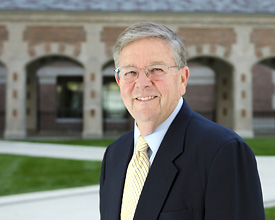When Dan Atkins calls a few of his friends together for a free, public symposium at U-M, it’s not your ordinary guest list.
The Oct. 8 Daniel Atkins Symposium, which honors the former dean of both the College of Engineering and the School of Information, is a reflection of his ongoing, 40-year career at U-M. The guest list includes three deans, vice presidents from Microsoft and Google, presidents and directors from a half-dozen foundations and luminaries such as U-M alum John Seely Brown and Vint Cerf — the man widely referred to as “father of the Internet.”

The Daniel Atkins Symposium honors the former dean of both the College of Engineering and the School of Information. Photo courtesy School of Information.
The all-day symposium includes lunch, and is open to the public. RSVP by Wednesday at bit.ly/atkins_symposium.
The guest list is a reflection of Atkins’ far-ranging career, which has included working with dozens of titans in industry, medicine, technology, government and nonprofit foundations.
“Dan is a visionary who makes things happen, time after time,” says Jeffrey MacKie-Mason, dean of the School of Information. “The luminaries coming to honor Dan demonstrate his impact on the world — heavy hitters from Google, Microsoft, the National Science Foundation, the Obama administration, the MacArthur Foundation, Hewlett Foundation and numerous universities both here and abroad.”
The symposium agenda includes a discussion of how distributed computing (cyberinfrastructure) can help teaching and research; the movement toward information schools, like U-M’s groundbreaking iSchool; the future of collaboratories (laboratories without walls, shared across vast distances) and digital libraries; and cyber-enabled learning.
Atkins is the W.K. Kellogg Professor of Community Information in the School of Information and professor of electrical engineering and computer science for the College of Engineering, the two schools primarily sponsoring the symposium. The event also is supported by the Office of the Chief Information Officer, the Office of the Vice President of Research and Microsoft Corp.
As just a few of his many notable accomplishments, Atkins:
• Developed high-speed computer arithmetic used in every processor chip today.
• Created first university student workstation, distributed network of its kind (CAEN), which included the largest equipment purchase from an unknown company … the Apple Lisa, a personal computer from the early 1980s.
• Presided over the College of Engineering with former U-M President Jim Duderstadt (one of the Symposium organizers) and Chuck Vest, tripling the school’s sponsored research volume in five years.
• Led the U-M Digital Library Initiative and created JSTOR, used by millions for research, teaching and learning.
• Founding dean of the School of Information, securing $20 million in private foundation and corporate support to start the school.
• Consultant to the Kellogg Foundation for use of information and communication technology for educating at-risk youth in the United States and for rural communities and higher education in South Africa.
• Chair of National Science Foundation Blue-Ribbon Advisory Panel on Cyberinfrastructure.
• Inaugural director of the U.S. Office of Cyberinfrastructure in the National Science Foundation.
“It’s really an honor to have worked with so many visionary men and women over the course of my career,” Atkins says. “They’re giving their time to help share some of the ongoing work we’re doing in a number of areas in computing, discovery and learning, and to discuss the big issues facing us today. I’m looking forward to hearing what they have to say.”

